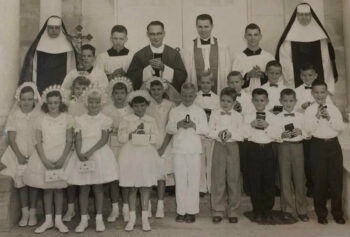The Word was Made Flesh and Dwelt Amongst Us

by Sue Jones
A person growing the Monday to Saturday habit of Lectio Divina needs that prayerful habit to be fed during the celebration of Sunday Eucharistic. It is from the Eucharist that a person comes to know his or her self as a person made in the image of God’s love, a Catholic person called to be sacrament - to live a life which sacramentalises every aspect of God’s creation.
When God calls a person into his love more nearly through the habit of Lectio Divina he does not uproot them from family and parish life into a more spiritually, sophisticated or educated way of being a Catholic. But the habit of Lectio Divina has a tradition in the Church of revealing God’s will to the person who prays reflectively. God’s will for a person can be unsettling. It may not be in accordance with a person’s plan. It can at times seem to demand a depth of love which the person does not have or to demand a change which a person feels he or she could do without.
Hearing the call from God into our lives may feel in some degree like having the ground beneath oneself cut away. Obeying the call to come closer to God usually results, after a period of intense prayer and mental anguish, in a change of lifestyle and habit. And so a young man might go off to be a priest or brother, a young woman may join a religious congregation. But the adult lay person called into the habit of Lectio Divina stays rooted in the domestic, Sunday, sacramental life of the Church tilling new life into it, forming a little, lay spirituality in his or her life for the life of the world.
Vatican II thought the laity had the life style and the numbers to share in God’s life in an informal, but quite spiritual, charismatic way, both in domestic and universal environments. The two evangelising environments are deeply connected. If a person can evangelise his or her children then a person, through the habit of Lectio Divina and the habit of Sunday Mass will, through the grace of God, be able to evangelise the world.
Laity have the lifestyle to evangelise ad hoc outside of the domestic Church but we may not have the necessary Catholic spirituality. The situation of finding ourselves alone in a sticky situation without knowing instinctively how to be sacrament to another person in need is a tragedy.
 In former times the laity had a strong Catholic identity in the world. Living full sacramental lives had much to do with that identity. It may have had much to do with rule keeping but this identity almost evangelised for us.
In former times the laity had a strong Catholic identity in the world. Living full sacramental lives had much to do with that identity. It may have had much to do with rule keeping but this identity almost evangelised for us.
Today the world is against us and the Catholic, sacramental story of love of God, neighbour and self has become infertile. We do not need a new identity, neither do we need the old one back. We have tried and lived through so much change but seem to be getting or going nowhere except into more of the same, with different buzz words at different sorts of meetings. Perhaps we need now a period of prayer - goodness knows we have tried every other sort of change.
The private habit of Lectio Divina could turn us around to face God once more and help us find out what it means to be a person made in the image of God’s love. When enough people are discovering that, then we will have a new identity in the world.
The acid test of a lay spiritually at work in the world is the same as it was in Jesus Christ’s time. It is the ability of the religious individual to recognise and respond to the need of the stranger who comes to me out of the mist of the created order having experienced some disorder of its goodness. Meditating and reflecting on the Word, coming into a Samaritan depth of holiness would be a goal in the Catholic lay tradition of prayer.
 The story of the Good Samaritan tells me that many can recognise the need of the stranger. Responding to that need is a different story. It tells me that having a hard-edged, lifeless cultural or religious identity in the world can be a barrier to God’s divine love being shared through a Catholic person in an ad hoc way.
The story of the Good Samaritan tells me that many can recognise the need of the stranger. Responding to that need is a different story. It tells me that having a hard-edged, lifeless cultural or religious identity in the world can be a barrier to God’s divine love being shared through a Catholic person in an ad hoc way.
Since Vatican II the laity have been moving away from our old identity in the world towards a new more spiritual identity which works better through a person than an institution. The old identifying features of Catholic life, whilst good are simply not flexible enough around the edges to infiltrate and heal the anti-Christian world. Edges of Catholic life which are broken open by Eucharist and Word have the necessary sensitivity to work well with the immediacy of God’s Holy Spirit in tight situations.
The Good Samaritan in Jesus’ parable managed, without having time to think, to love God and his neighbour and be true to himself all in one immediate, prayerful, practical act of love. This ordinary person going about his business in the world restored and healed God’s created order, which unknown, un-judged people had violated.
 Entries(RSS)
Entries(RSS)